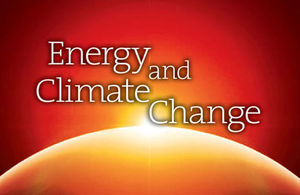IEA launches major report on Climate Change in London
OECD Ambassador Nick Bridge chairs panel discussion with prominent IEA and UK speakers

World Energy Outlook Special Report on Energy and Climate Change
The International Energy Agency (IEA), one of the most influential and best known of the OECD’s sister organisations, has launched the World Energy Outlook Special Report on Energy and Climate Change. This report is the IEA’s direct contribution to the upcoming United Nations climate change negotiations in Paris in December 2015.
The UK’s Foreign and Commonwealth Office part funded the report and hosted its launch in London on 15 June. Nick Bridge (UK Ambassador to the OECD and the IEA) chaired a high level panel discussion with Dr. Fatih Birol (IEA Chief Economist), Lord Bourne (DECC Parliamentary Under Secretary of State), Sir David King (Foreign Secretary’s Special Representative for Climate Change), and Matthew Bell (Chief Executive of the Committee on Climate Change).
The IEA’s main message is that a peak in global energy related emissions (2/3 of all emissions) can be achieved as early as 2020 at no economic cost. This would also ensure that achieving the agreed target of limiting the warming of global temperature to 2 degrees remains possible. The IEA sets out clear, regional recommendations for how this can be achieved through five measures while using only technologies that are currently available:
1) Increasing energy efficiency measures in transport, buildings and industry,
2) Progressively reducing the use of the least-efficient coal-fired power generating plants and banning the construction of new ones,
3) Increasing investment in renewable energies in the power sector from $270 billion in 2014 to $400 billion in 2030,
4) Gradually phasing out fossil-fuel subsidies to most end-users by 2030,
5) Reducing methane emissions in upstream oil and gas production.
In addition, the IEA clearly spells out what the energy sector needs from the UN negotiations in Paris to be able to deliver a global low-carbon energy transition:
· A review cycle for national emission reduction commitments every five years,
· The translation into a long term emission goal of the agreed two degrees target,
· The identification of key methods to track the energy transition in each sector.
After the launch, Nick Bridge recorded his first impressions in a video blog.
Ambassador Bridge’s first impressions
The UK will continue to support the IEA shape this important debate on how to place the energy sector on a track that not only allows it to play its part in fighting climate change, but making a vital contribution to ensuring energy security and energy access to all.